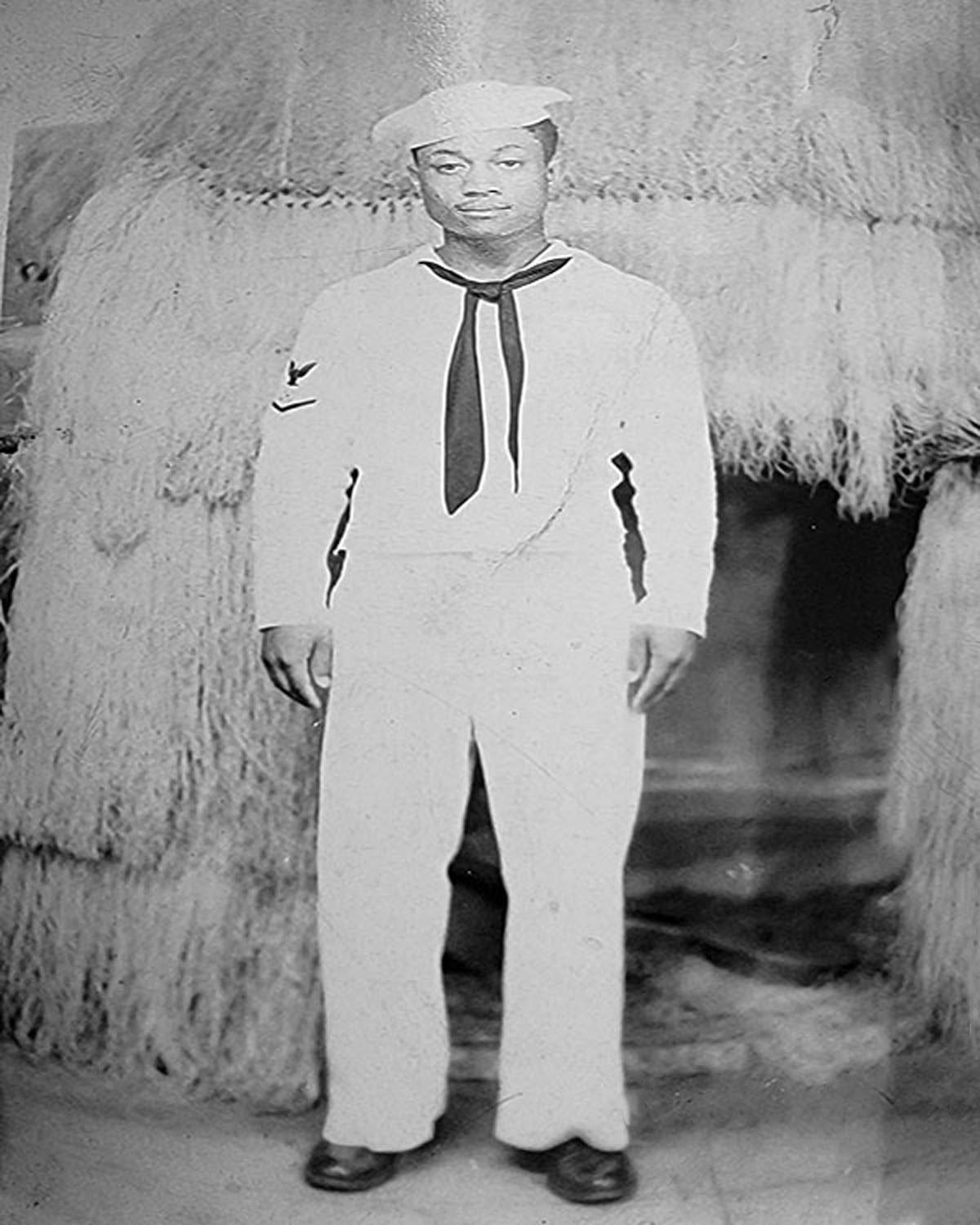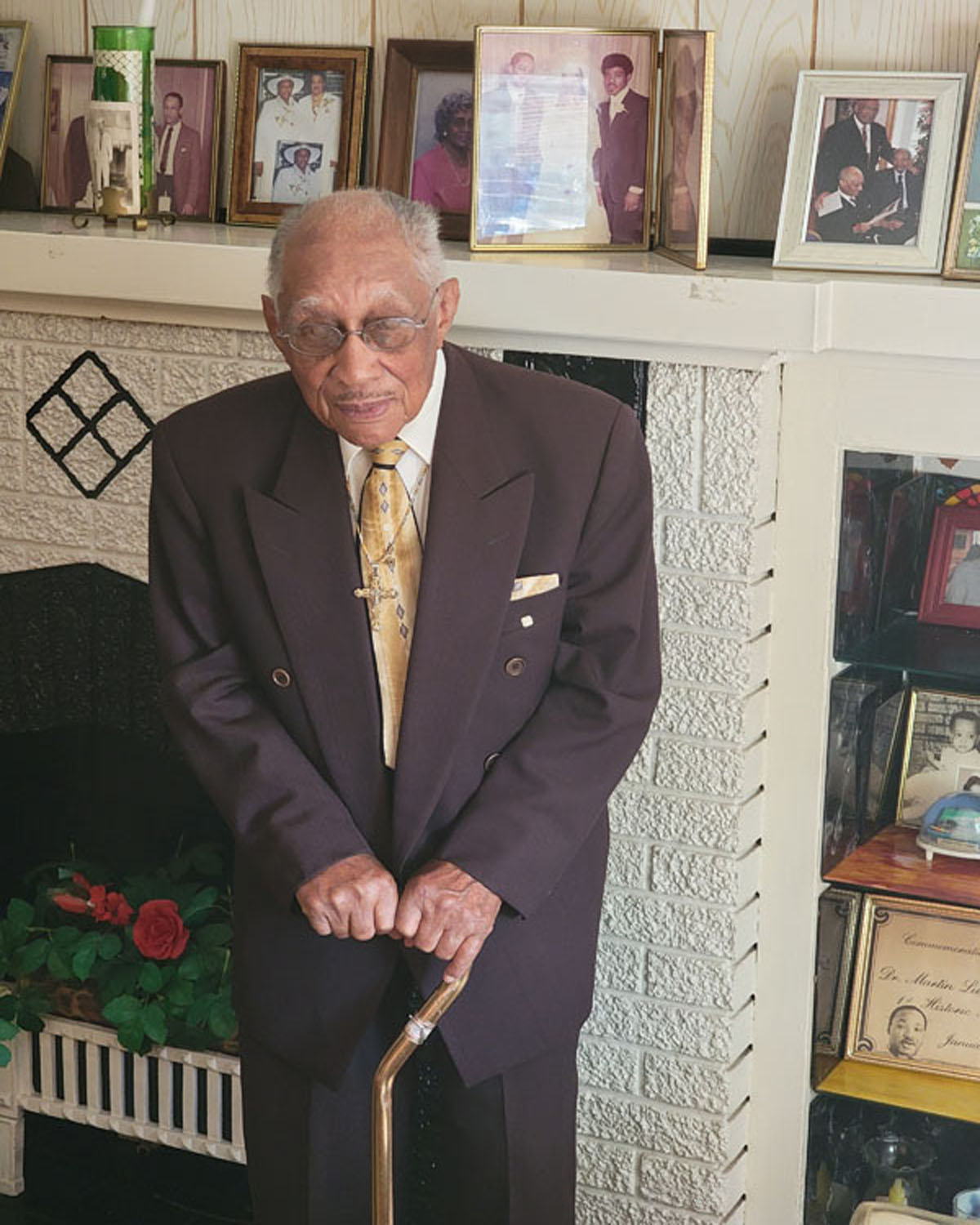Navy World War II Chicago, IL Flight date: 08/18/21
By Scott Nelson, Honor Flight Chicago Veteran Interview Volunteer
Curtis Bentley, age 98, grew up in the rural town of Thomaston, Georgia, approximately 90 miles from Atlanta. His five sisters and three brothers grew up on the family’s 200 acre farm “growing anything we could eat, except for the cotton.” The family raised the food to sustain themselves and grew the cotton to sell to make ends meet. It was hard work, day in and day out. He quickly learned the real meaning of hard work and sweat when he left school at 8th grade to solely work in the fields. Each one of his siblings left school at 8th grade to work the fields and support the family. “Rest” was a four-letter word that they did not experience much. Family, faith and hard work were the foundation that established him as a young man.
Because Curtis was working on a farm, he was given a deferment from serving in World War II. He was needed in the field to support his family. On June 10, 1944 he had enough of working in the hot Georgia sun and traded in his overalls for the uniform of the United States Navy. He enlisted in the Navy because he liked how handsome they all looked in their sharp uniforms. He did not consult with his family or friends before enlisting and by the time they could grasp what he was doing he was on a train headed to the Naval Station Great Lakes in Chicago.
His travel experience prior to enlisting in the Navy was very limited. He had not traveled far from the family’s 200 acre home and now he was headed to Chicago, a place he only heard stories about. Upon arriving at Great Lakes, his new life had just begun. Instead of planting crops and picking cotton, he had new challenges during his six weeks of Basic Training that included learning to swim and weapons training. He already knew how to follow orders from his father so that was the easy part. After training, he went back home to Thomaston for a 14 day leave before returning to Chicago.
The United States was quite a different place when Curtis grew up and things were not much different in 1944. Whether it was Georgia or Chicago, segregation was the norm. As a Negro, the opportunities for advancement were scarce; common decency and respect were in very short supply. This applied to the Navy as well. When he left Great Lakes, he knew that he would be serving in the Messman/Steward Branch of the Navy. The Messman Branch, responsible for feeding and serving officers, was a racially segregated part of the U.S. Navy. White sailors could not serve in the Messman Branch, which was composed almost exclusively of African-Americans recruited in the U.S. and Filipino, Chinese and other foreign nationals who had been recruited overseas into the U.S. Asiatic Fleet. He understood that and was just glad he was not in the hot fields of Georgia.
After returning from his leave, he was quickly put on a train headed to Treasure Island Naval Base in California. Treasure Island was a large discharge/entry point for U.S. Naval ships and submarines. At this point Curtis knew he was going to be serving the Navy, but on land. He worked in mess halls on the lines, cleaning and mopping from dawn to dusk. After a short time in California, he was sent off to Pearl Harbor, Hawaii. It was here that he earned the respect of the company commander and was afforded his first promotion. With a few friendly words from a friend, he was promoted to 2nd Class Coxswain and was in charge of twelve men on the service line. Life was getting a little bit easier and he was finding his way and learning that he could rest a bit.
After six months in Hawaii, he was sent with an armada of fifty ships to Okinawa, where on April 1, 1945, the United States Marines and Army conducted the largest amphibious invasion of the war in the Pacific. He was a long way from the fields of Thomaston, Georgia. Because the invasion and battle was so intense, he had to wait on the ship for 21 days before they could make landfall and begin to get the men fed with hot meals. Witnessing the Navy ships trying to shoot down Japanese kamikaze planes attacking Navy warships horrified him and his fellow mates. During those days he learned that President Roosevelt had died. He did not know if there was any type of ceremony or religious service or remembrance for the president – it was just another day on the ship. Death and destruction were a ship away. He began to wish that he was back in the fields of Georgia.


On the 21st day, he and about forty men transferred to a landing craft headed to the island of Okinawa. During his first night on the island, he soon witnessed firsthand the devastation of war. The only place to take shelter was in and around the tunnels and craters. He slept beside dead Japanese soldiers that were shaped in all forms of death. He was horrified at the brutality. Things improved for him and the others in his unit as they followed well behind the destruction and devastation from the battle lines.
After reaching their destination, he and his unit served the needs of the soldiers as they moved up the mountain to their destination, an airfield. On August 6, 1945, approximately four months after arriving at the island of Okinawa, the first atomic bomb was dropped. After the second one was dropped three days later, they were making plans for coming home. The war was over but his service to his country was not. After two more months in Okinawa, he was finally going back to the States.
It was a better feeling heading back to Hawaii from Okinawa. The war was over and he could now think about his future. But he still owed the Navy his time since he did not have enough points to leave the Navy. He was stationed in Hawaii until 1946, guarding a food/ammo/clothing depot. In February of 1946, after traveling through the Panama Canal, he made it to Jacksonville, Florida where he was discharged.
Curtis spent about a year in Thomaston before deciding to move to Chicago to find work and a new life. He moved to the Bronzeville area and started working for the Bienenfeld Glass Company, where he met the love of his life, Sernater. They married on December 17, 1955. Curtis continued to work for the company for 37 years. Sadly his wife passed away in 2010; they never had children.
Curtis is proud that he has always been a contributor to society. He never used the GI bill and has never used the VA services. At 98, he is in good health except for his two hip surgeries, back surgery and cataracts. With regards to his health Curtis said, “I have had everything but a baby.”
When asked about memorable moments from the service he said he was around so much water and for such a long period of time “I said to myself, when I get home I am never taking a bath.”
Curtis, thank you very much for your service during a difficult time. Enjoy your well-deserved trip of honor to Washington D.C.!


